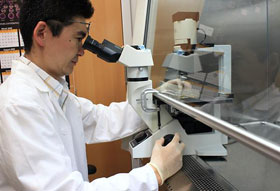Discovering new stem cells in human skin and bones
On April 19, a group of researchers from Tohoku University, Japan, published the results of a study to detect a type of stem cells in the skin and bone marrow of adults.

Illustration.
The results are published in the journal of the National Academy of Sciences.
The group of scientists led by Professor Mari Dezawa said new cells, also called Muse cells, will be a new source of stem cells for scientific research and treatment.
Until now, scientists have only exploited stem cells from embryonic stem cells and artificial almighty cells.
Research has shown that Muse cells have a lower rate of development than embryonic stem cells and artificial Almighty cells, but there is little risk of malignant complications. This helps to apply to higher experimental treatment.
The team of researchers paid attention to Muse cells when they realized that the cells had similarities with embryonic stem cells.
After transplanting, Muse cells transformed into several chains, including the marrow, muscle and liver.
During the experiment on mice, when the Muse cells were implanted in damaged skin, muscle, and rat liver, the scientists found that Muse cells transformed into a suitable sequence, and stopped reproducing after two weeks. This is a big difference compared to embryonic stem cell transplantation and almighty cells.
In addition, Muse cells were implanted in non-malignant mouse testicles after six months, while embryonic stem cells produced tumors after eight weeks.
- Stem cells in human bones can renew themselves
- For the first time successfully created stem cells from human skin
- Produce stem cells from human skin
- Create fast skin from stem cells, save burn patients
- Create tiny brain from human skin
- Successfully developed human heart from stem cells, beating as usual
- Detecting stem cells of all skin cells
- Can skin cells turn into eggs and sperm?
- The world's first artificial skin from stem cells
- 10 interesting things about human skin
- Regenerating stem cells from mouse skin
- Transform human skin cells into brain cells
 Why do potatoes have eyes?
Why do potatoes have eyes? 'Tragedy' the world's largest carnivorous life: Death becomes ... public toilet
'Tragedy' the world's largest carnivorous life: Death becomes ... public toilet Tomatoes were once considered 'poisonous' for 200 years
Tomatoes were once considered 'poisonous' for 200 years Detecting microscopic parasites on human face
Detecting microscopic parasites on human face